Questões de Língua Inglesa da Fundação CESGRANRIO (CESGRANRIO)
Lista completa de Questões de Língua Inglesa da Fundação CESGRANRIO (CESGRANRIO) para resolução totalmente grátis. Selecione os assuntos no filtro de questões e comece a resolver exercícios.
 Concerning the future of the oil job market, Text II suggests that
Concerning the future of the oil job market, Text II suggests that
- A. petroleum and natural gas industries will soon be facing a shortage of skilled workers in the global market.
- B. qualified professionals for specific positions in the oil industry will find more opportunities in the Brazilian job market.
- C. factory floor staff with technical skills will soon be replaced by specialized employees with a university degree.
- D. local expertise will be outnumbered by foreign professionals, since Brazilian engineers are not qualified for the oil industry.
- E. more jobs are going to be created to attract a higher number of foreign professionals to the Brazilian oil industry in the next decade.


A comparison between Texts I and II reveals that
- A. only Text I discusses the complex challenges faced by oil companies when hiring foreign workers.
- B. only Text II mentions the necessary skills and qualifications expected from prospective employees in the oil industry.
- C. both Text I and Text II list the wide variety of professionals that have been demanded by oil companies.
- D. neither Text I nor Text II comment on the benefits derived from choosing a career in the oil business.
- E. Text I denies the importance of hiring employees with previous experience in the oil industry while Text II focuses on the relevance of contracting qualified professionals to perform in the same area.
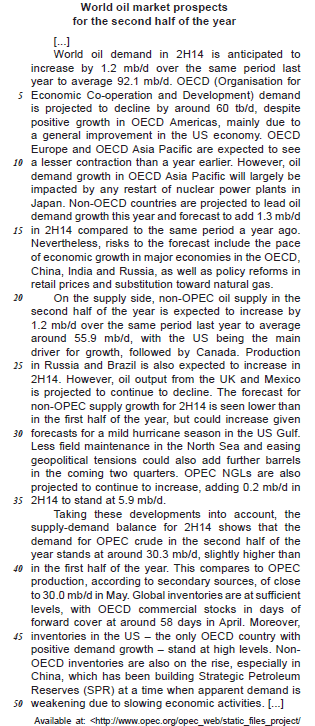 According to Text I, world oil demand in 2H13 was
According to Text I, world oil demand in 2H13 was
- A. 1.2 mb/d
- B. 90.9 mb/d
- C. 92.04 mb/d
- D. 92.1 mb/d
- E. 93.3 9 mb/d
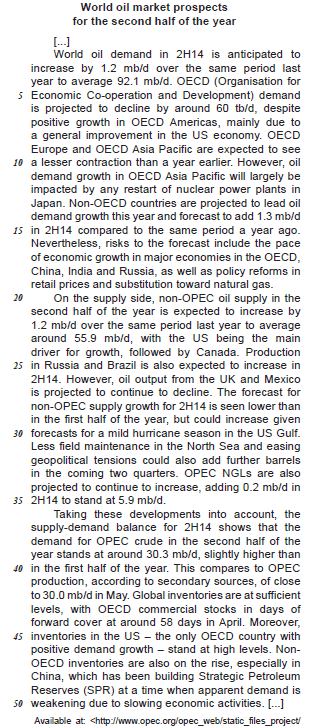 According to Text I, the statement OECD Europe and OECD Asia Pacific are expected to see a lesser contraction than a year earlier (lines 8-10) implies that the oil demand in those countries
According to Text I, the statement OECD Europe and OECD Asia Pacific are expected to see a lesser contraction than a year earlier (lines 8-10) implies that the oil demand in those countries
- A. will decrease less in 2H14 than it did in 2H13.
- B. will contribute to the demand growth of OECD countries in 2H14.
- C. will contribute to the movement toward natural gas.
- D. will contribute to the restart of nuclear power plants in Japan.
- E. was affected by a general improvement in the US economy.
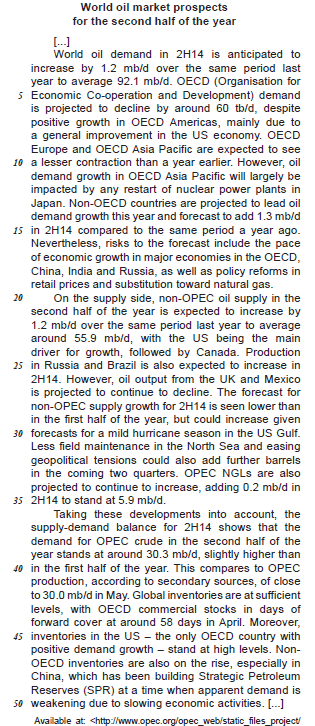 According to Text I, the statement On the supply side, non-OPEC oil supply in the second half of the year is expected to increase by 1.2 mb/d over the same period last year to average around 55.9 mb/d, with the US being the main driver for growth, followed by Canada (lines 20-24) implies that
According to Text I, the statement On the supply side, non-OPEC oil supply in the second half of the year is expected to increase by 1.2 mb/d over the same period last year to average around 55.9 mb/d, with the US being the main driver for growth, followed by Canada (lines 20-24) implies that
- A. Canada will need more oil than the US.
- B. Canada will be the second largest OPEC country to need oil in 2H14.
- C. OPEC countries will need a larger amount of oil in 2H14 than they did in 2H13.
- D. Non-OPEC countries will need a larger amount of oil in 2H14 than they did in 2H13.
- E. Non-OPEC countries will produce a larger amount of oil in 2H14 than they did in 2H13.
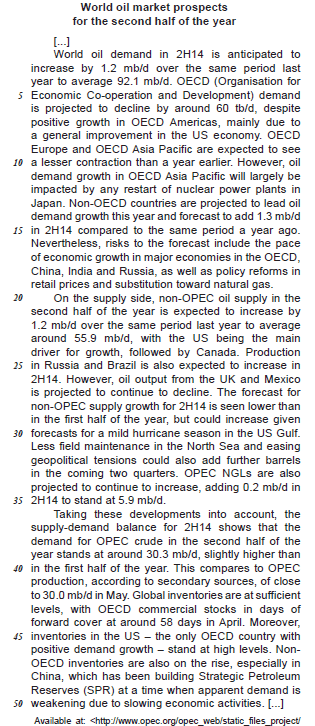 In the fragments of Text I World oil demand in 2H14 is anticipated to increase (lines 2-3), OECD (Organisation for Economic Co-operation and Development) demand is projected to decline (lines 5-6), oil demand growth in OECD Asia Pacific will largely be impacted (lines 11-12), Production in Russia and Brazil is also expected to increase (lines 24-25) the boldfaced verb forms indicate
In the fragments of Text I World oil demand in 2H14 is anticipated to increase (lines 2-3), OECD (Organisation for Economic Co-operation and Development) demand is projected to decline (lines 5-6), oil demand growth in OECD Asia Pacific will largely be impacted (lines 11-12), Production in Russia and Brazil is also expected to increase (lines 24-25) the boldfaced verb forms indicate
- A. past time
- B. present time and future time
- C. the authors desire for the future
- D. the authors promise for the future
- E. the authors commitment to the future
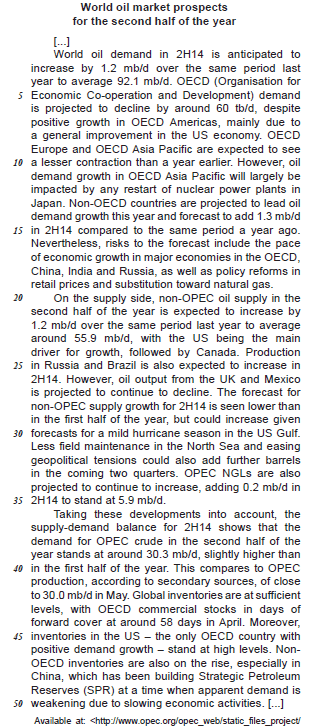 The words of Text I: output (line 26), mild (line 30), balance (line 37) and inventories (line 42) may be replaced, without change in meaning, respectively, by:
The words of Text I: output (line 26), mild (line 30), balance (line 37) and inventories (line 42) may be replaced, without change in meaning, respectively, by:
- A. product, gentle, average, and lists
- B. product, gentle, equilibrium and stocks
- C. product, sufficient, equilibrium and lists
- D. stocks, gentle, equilibrium and sources
- E. product, gentle, equilibrium and lists
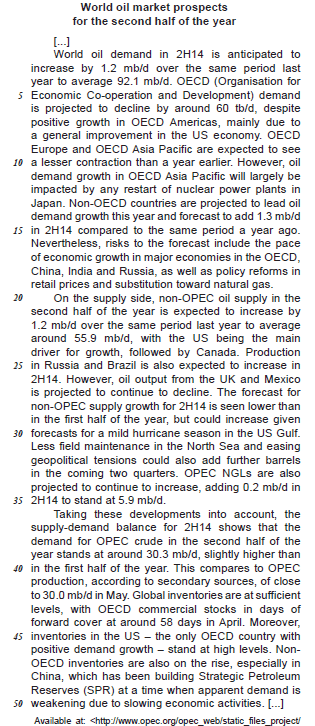 In the following fragment of Text I: Less field maintenance in the North Sea and easing geopolitical tensions could also add further barrels in the coming two quarters. (lines 31-33) the word quarters means a(an)
In the following fragment of Text I: Less field maintenance in the North Sea and easing geopolitical tensions could also add further barrels in the coming two quarters. (lines 31-33) the word quarters means a(an)
- A. time unit equivalent to the fourth part of a year
- B. time unit equivalent to the fourth part of an hour
- C. time unit equivalent to four months of the year
- D. volume measure unit equivalent to the fourth part of a gallon
- E. American coin worth 25 cents of a dollar
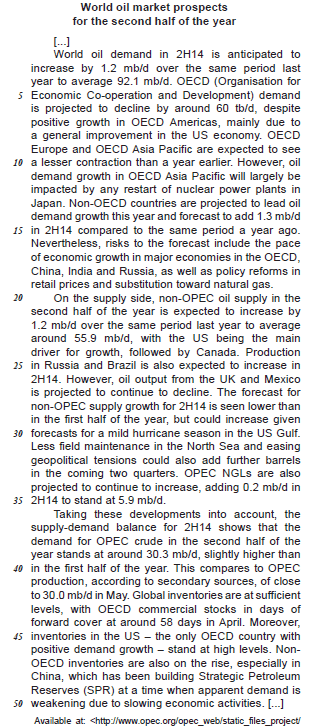 In the fragment of Text I Less field maintenance in the North Sea and easing geopolitical tensions could also add further barrels in the coming two quarters. (lines 31-33), the expression easing geopolitical tensions means geopolitical tensions that are
In the fragment of Text I Less field maintenance in the North Sea and easing geopolitical tensions could also add further barrels in the coming two quarters. (lines 31-33), the expression easing geopolitical tensions means geopolitical tensions that are
- A. harmful
- B. enhanced
- C. alleviated
- D. alleviated
- E. fun to deal with
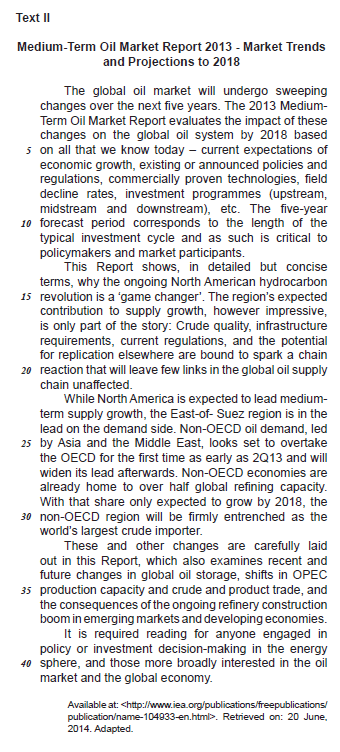 The expression from Text II upstream, midstream and downstream (lines 8-9) implies that investment programmes will be respectively directed to costs that involve
The expression from Text II upstream, midstream and downstream (lines 8-9) implies that investment programmes will be respectively directed to costs that involve
- A. oil transportation by boat against water flow / oil storing in the middle of the river journey / oil transportation by boat following water flow.
- B. oil transportation by boat following water flow / oil storing in the middle of the river journey / oil transportation by boat against water flow.
- C. oil exploration and production / oil processing, storing, transporting and marketing / oil operations after the production phase through to the point of sale.
- D. oil exploration and production / oil operations after the production phase through to the point of sale / oil processing, storing, transporting and marketing.
- E. oil processing, storing, transporting and marketing / oil exploration and production / oil operations after the production phase through to the point of sale.


